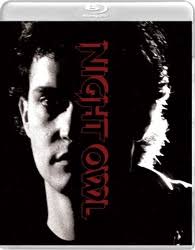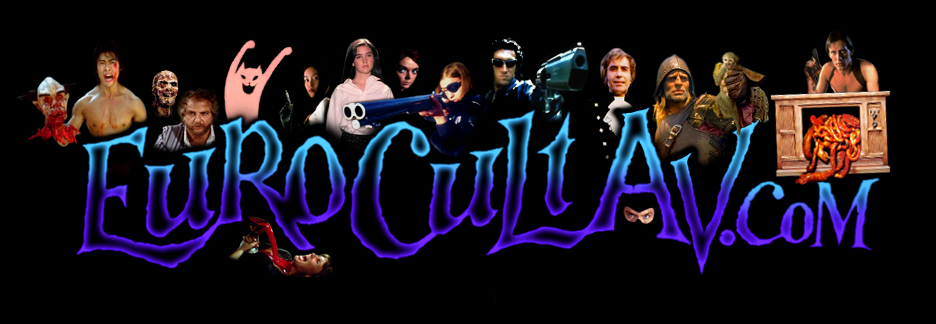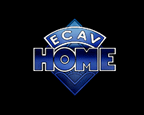Night Owl
Director - Jeffrey Arsenault
Cast - James Raferty, John Leguizamo, David Roya, Caroline Munro
Country of Origin- U.S.
Distributor - Vinegar Syndrome
Number of discs – 2
Reviewed by - Steve Lewis
Date- 07/18/2019

Set in the backdrop of New York City’s East village of the early 1980s, a youthfully eternal vampire squats in a vacant building, works night shifts at an eatery, and picks up night club women to have sex with and to feed off their warm blood. His endless cycle night after night contents his endless life until he meets a beautifully dark kindred spirt in one of his potential victims and decides not to whip up a beverage out of her carotid artery in their sultry embrace. Simultaneously, a young Puerto Rican man searches anxiously for his sister, one of the vampire’s victims, who goes missing without a trace. The vampire’s pang from the abstinence of human blood and being the target of a determined, desperate man collide on the vehement streets of New York City that comes to a violent and ghastly end for those that closely surround the night feeder.
Jeffrey Arsenault, the director behind the erotic “Crimson Nights” and “Vampire Playmates,” kicked off his initial vampire crazed career with the visceral “Night Owl.” Also penned by Arsenault over a decade earlier and shot over the course of 2 years, the 1993 black and white bleak twist of a metaphor that’s associating vampirism with drug addiction that shows great admiration for previous works, such as George A. Romero’s “Martin,“ and even stands a precursor to other NYC blood sucker films devoid of color (i.e. Abel Ferrera’s “The Addiction” from 1995). "Night Owl" captures not only the Big Apple's shiny and coarse flavor, but also the dangerous power of habituation and dependency in youth.
Though the top bill goes to Spawn's John Leguizamo, who by the time this film was released a house hold name because of his role as Luigi Mario in Super Mario Bros. movie opposite the now late acting icons Bob Hoskins and Dennis Hopper, it was the introduction of James Raftery who scored the vampire role in Jake. To date, "Night Owl" is listed as Raftery's last performance in an unadulterated and lonely role requires charisma, ruthlessness, and complexity. Raftery checks all necessary boxes. Between Leguizamo and Raftery, everything left is standing room only, but for an indie film, "Night Ow" has a massive cast of eclectic talent, including "Billy Jack's" David Roya, Yul Vazquez ("American Gangster"), Screaming Rachel ("Vamp Bikers"), Andy Warhol side kick Holly Woodlawn, and Karen Wexler ("The Refrigerator"). Also introducing Lisa Napoli, Ali Thomas, and a special guest appearance by Caroline Munro of William Lustig's "Maniac."
“Night Owl” is by no means a parallel program to Abel's “The Addiction” by any technical means. Arsenault’s dingy vision can only be described as raw and rough. There’s no breathtaking visuals on the streets of the city that never sleeps, no glamourous characters to fall head over heels for in awe and in amiability, just bleak and cold sadness of self-destructive apathy through Arsenault’s guerilla style filmmaking edgy with rough edits and cuts to hit this sucker out of the park as an on-the-streets production.
For the first time on Blu-ray home video, Viinegar Syndrome presents "Night Owl" in it's original 16mm format, fully scanned and restored in 2k, keeping the original aspect ratio of a full framed 1.33:1 during the full 80 minute runtime. As aforementioned, Jeffrey Arsenault integrity is in the gritty black and white, washed out, and saturated with natural grain. As a whole, the presentation is fitting for the story, but might desensitize viewers with harsh contrast with soft details and awkward cuts. This release is a dual format, providing a DVD alongside, but this reviewed critiqued the Blu-ray version of the film.
The English language DTS-HD mono track fairs about the same calibre with lossy, static quality. Dialogue renders from robust at times to flat more than often. Depth and range hardly make the cut as the film solely relies on a post-punk and party soundtrack to give it some kind of punch and a means to provide more locational feng shui. English SDH subtitles are available.
The hefty bonus material clearly a centerpiece to this release with a titled "Night Life" interview with director Jeffrey Arsenault, "Living for the Night" interview with star James Raferty, and "A Chance to Die" interview Karen Wexler. All three segments are wealth of background gold from on the ground troops who just vomit expose. There's an archival interview with Arsenault, original cast auditions, the raw mock interview tape of Caroline Munroe from London, original video trailer, a new audio commentary with Arsenault, and it wouldn't be a Vinegar Syndrome release without reverse cover art.
Better grimy vampire films are available, but "Night Owl" manages to leave a walloping impression that doesn't monkey around with visual stimuli as it's sincerely a primeval film of simple instinctual desires and behaviors in sex, hunger, addiction, and existentialism that are inverted to horrific surrealism. What better way to showcase such an exhibition of all those qualities than on the streets of New York City in the 1980's to early 1990's when 42nd Street waded perversely in the very bosom of the metropolis. "Night Owl" will have a niche market, but Vinegar Syndrome puts out an attractively solid, bonus feature-ladden release sure to score with fans. Recommended.






